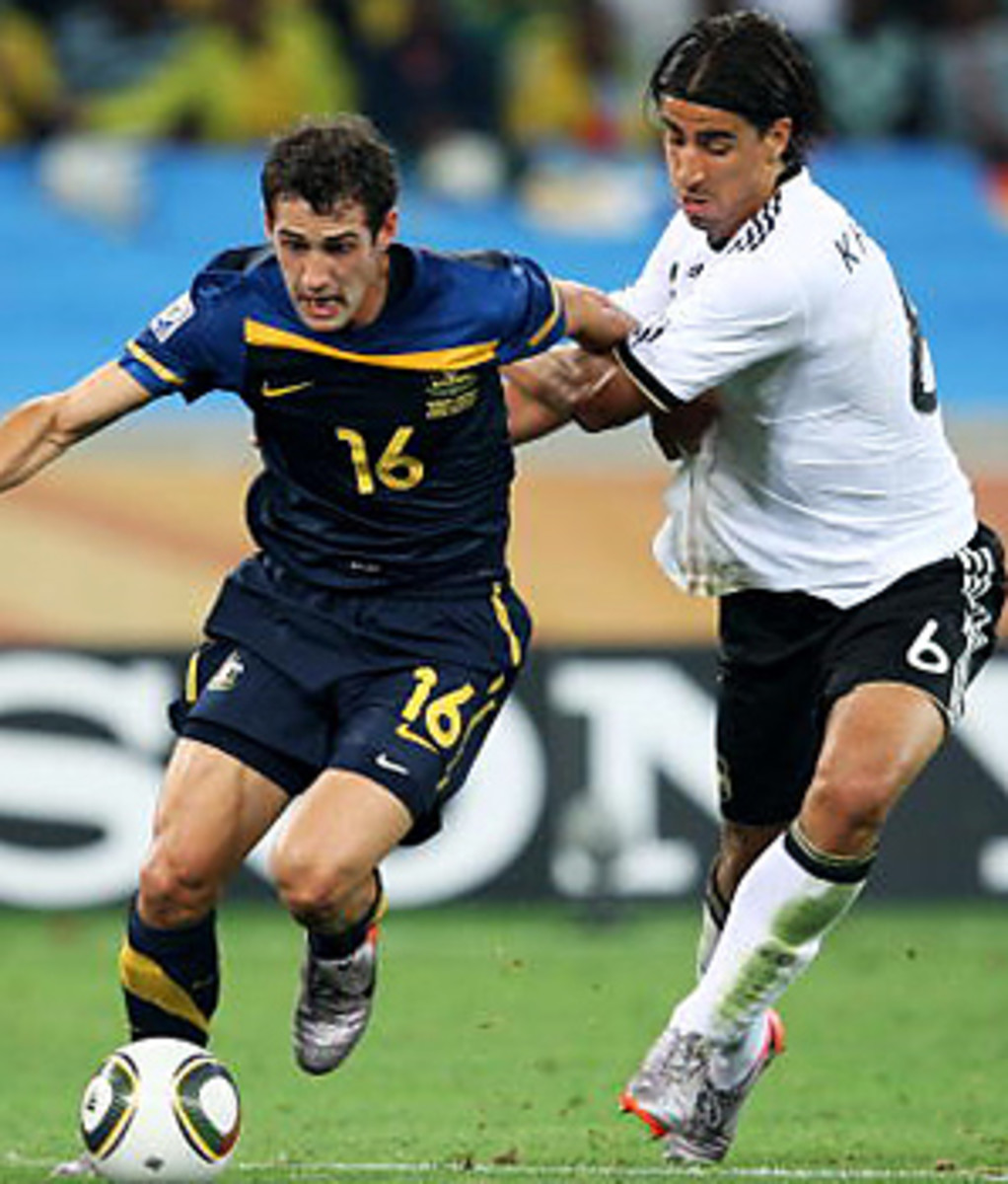Khedira represents the new Germany: dynamic and diverse
Less than a month ago, this line of inquiry would have been unthinkable. The loss of the 33-year-old Germany skipper was seen as a serious blow to the World Cup chances of the "Nationalmannschaft." Some commentators even feared that the team might not survive the group stage without the former Bayern Munich and Chelsea midfielder on the pitch.
The brilliant 4-0 destruction of Australia in Durban on Sunday has now fundamentally altered perceptions, to the point that those perceptions have even veered a little too far toward the other extreme.
Mesut Özil (Werder Bremen) and Thomas Müller (Bayern Munich) were the most-feted stars on the night, but it was another man's performance that got Bild -- and quite a few supporters back home -- wondering whether Ballack was really being missed. Sami Khedira of Stuttgart had an excellent game in Ballack's position at the center of midfield, in what was only his 15th international appearance. In fact, he was so good that Löw later compared him to "the young Ballack."
"I'm proud to be part of the team but don't like these comparisons," the 23-year-old told SI.com. "I'm not trying to copy anyone. Everybody knows that Michael is a world-class player with immense experience."
Khedira, a German championship winner with Stuttgart in 2007, has yet to play at this level consistently. Truth bet told, his last two seasons in the Bundesliga have been slightly disappointing -- at one stage he was only Löw's sixth choice in defensive midfield and more or less off the DFB team's radar.
As soon as Ballack was ruled out of the competition in mid-May, however, it was clear that Khedira would get the chance to shine -- in his own, selfless and humble way. "I'm not one for pushing to the forefront [of attention]," he said. "I don't mind doing the dirty work. I'm happy to run for Mesut Özil, so that he can decide the match." Both of them already combined to devastating effect at last year's U-21 European championship in Sweden, where Germany hammered England 4-0 in the final.
Khedira, the Stuttgart-born son of a Tunisian steelworker and a German mother, also exemplifies the New Germany, in both senses of the term. This World Cup squad is not only the country's youngest since 1934 but also its most multicultural: Eleven of the 23 members have a migratory background. The squad's composition neatly reflects sociopolitical as well as football-specific changes that coincided at the turn of the century. The country liberalized its old, draconian citizenship laws to allow children of immigrants easier access to German passports, while the German FA, spurred into action by a lack of young talent, made a conscious effort to integrate and groom players from the immigrant community.
"Of course we noticed that it's something new to have German national players with Turkish, Ghanaian, Nigerian or Tunesian roots, but for our generation it's very normal," Khedira said. "I have been playing together with [Hamburg's] Dennis Aogo and Jerome Boateng as long ago as the U-15s. We have some players called Khedira and some called Müller. We don't know any differently."
The German team was profiting from the cultural mix, he argued: "Up front, we exude a bit of [Latin] ease, but defensively, we are incredibly disciplined, very German." People back home had realized that "these boys like playing for Germany, work their socks off for Germany and play good football." That made it easier for the country to identify with the team, he added.
Khedira's own identity is very much defined by growing up in southwest Germany. "I feel Swabian," he said, in reference to the region's strong work ethos. A key moment in his career came as a teenager when he turned up late for the team bus and was left stranded. He's always been punctual since. "You'll never get beyond a certain level as a professional athlete if you're sloppy," he said.
Khedira regrets losing most of his Arabic language skills ("I had German friends, so I spoke only German"), but there are still strong ties to his father's homeland. "Tunisia didn't qualify so I'm their only 'representative' here," he said. "I know that they're rooting for me there. I can make two countries happy. But my family [in Tunisia] knows that Sami is German and wants to win the World Cup [for Germany]."
As if closing down spaces in front of the back four, running more than any teammate and joining attacks weren't enough tasks for him, Khedira is also in charge of the music in the changing room. He has inherited the position of team deejay from former Germany international Gerald Asamoah and chosen a morale-boosting song called "Fackeln im Wind" (torches in the wind) for this tournament. It's by rapper Bushido, a German-Tunisian, like Khedira.
"The song was written specifically for the German national team," Khedira told the newspaper Süddeutsche Zeitung. "It's a song that deals with the topic of integration. That's why I got involved with it. Bushido has foreign roots, like many in our team, but he identifies 100 percent with our country."
The feeling, as far as the team is concerned, is now mutual.





